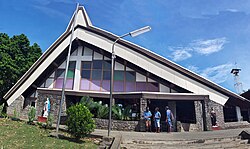The Holy Cross Cathedral,[2][3] also referred to as the Catholic Cathedral of Honiara, is the cathedral church and seat of the Metropolitan Archdiocese of Honiara (Latin: Archidioecesis Honiaranus). It is located in the city of Honiara, which is on Guadalcanal Island and is the capital of the Solomon Islands, a country in the southwest Pacific Ocean.[4]
| Holy Cross Cathedral | |
|---|---|
 | |
 | |
| 9°26′11″S 159°57′48″E / 9.436252°S 159.963472°E | |
| Location | Honiara |
| Country | |
| Denomination | Catholic Church |
| Tradition | Roman rite |
| History | |
| Dedication | Holy Cross |
| Consecrated | 17 September 1978[1] |
| Architecture | |
| Groundbreaking | 1976 |
| Completed | 1979 |
| Administration | |
| Archdiocese | Honiara |
| Clergy | |
| Archbishop | Christopher Cardone, OP |

Pope John Paul II elevated Honiara to its status of Metropolitan Archdiocese by papal bull, "Laetentur insulae multae", in 1978.[a][6] Archbishop Christopher Cardone assumed the pastoral responsibility for the archdiocese in 2016.[7][8] The church follows the tradition of the Roman or Latin rite.[citation needed]
Background and history
editHoniara's first Catholic cathedral was erected at the foot of the town's Vavaya Ridge (or Vatuliva Hill; now commonly, Cathedral Hill), pending construction of the permanent cathedral. This Holy Cross pro-cathedral was adapted from a large Quonset hut; it was blessed and opened to the public in 1957. A brick of the first Catholic mission in the Solomon Islands, built in 1845, was incorporated into its façade. The site chosen for the cathedral was believed to be that of the first Christian cross erected in the Solomons, planted by the expedition of Alvaro de Mendaña in 1568.[9] On the same spot, the first Mass in the Solomons was celebrated by a friar from among Mendaña's crew. This expedition of the Spanish Empire was Europeans' first encounter with the Solomon Islands.[b][11]
Its foundation stone laid in 1976, the permanent Holy Cross Cathedral, built on the same hill where the pro-cathedral stood, was consecrated and opened in 1978.[12] Its style has been described as "Pacific architecture".[13] There are several carved elements such as those seen on the altar and the lectern where it is possible to see the influence of local culture in the church.[citation needed]
See also
editNotes
edit- ^ The title of the papal bull is from Psalm 97:1.[5]
- ^ The Spanish expedition left for home after some six months of unsuccessful effort at colonisation; they encountered food shortages, ill health, internal conflict, and deteriorating relations with the local people. Apart from the unrecorded lives of several islanders abducted and taken to Peru by Mendaña, no further contact between Solomon Islanders and Europeans occurred until 1767, some two hundred years later. The Catholic Church, other than a short-lived attempt in the mid-1840s, did not return again until 1898, this time with a more long-lasting presence.[10]
References
edit- ^ Archdiocese of Honiara (1978), Souvenir of Consecration of Holy Cross Cathedral Honiara: 17th September, 1978, Honiara, Solomon Islands: Catholic Church; Provincial Press, [Booklet] – via Archives of the Anglican Church of Melanesia, 1975−2012, on deposit in the National Archives of Solomon Islands.
- Cited in: Archives Listing of Anglican Church, Province of Melanesia "Melanesia-related small publications" (PDF), p. 6, archived from the original (PDF) on 22 October 2021, retrieved 2 April 2023 – via Internet Archive
- ^ Chow, Gabriel. "Holy Cross Cathedral". GCatholic. Archived from the original on 14 December 2022. Retrieved 29 March 2023.
- ^ "Holy Cross Cathedral in Honiara on The Catholic Directory". The Catholic Directory. Archived from the original on 29 March 2023. Retrieved 29 March 2023.
- ^ Lonely Planet:
- McKinnon, Rowan; Carillet, Jean-Bernard; Starnes, Dean (1 January 2008). Papua New Guinea & Solomon Islands. Lonely Planet. p. 253. ISBN 9781741045802.
- Brown, Lindsay (2016). Papua New Guinea & Solomon Islands (10th ed.). Footscray, Vic., Australia: Lonely Planet. p. 429. ISBN 9781786573087.
- ^ For the text, see: Psalms 97:1
- ^ "Laetentur insulae multae" [Let the many islands rejoice]. Acta Apostolicae Sedis Commentarium Officiale: Acta Ioannis Pauli II (PDF) (in Latin). Vol. M-DCCCC-LXXIX. Vatican. 15 November 1978.
- ^ "Honiara Homily: Installation of Archbishop Chris Cardone, OP". Dominican Friars Province of St. Joseph. 16 September 2016. Archived from the original on 29 March 2023. Retrieved 29 March 2023.
- ^ Cheney, David M. "Honiara (Archdiocese)". Catholic Hierarchy. Retrieved 2 April 2023.
- ^ Moore, Clive (2020). "Holy Cross Catholic Cathedral, Honiara". Solomon Islands Historical Encyclopaedia, 1893-1978. Retrieved 11 February 2017.
- ^ Laracy, Hugh (1976). "The Vicariate of Melanesia". Marists and Melanesians: A history of Catholic missions in the Solomon Islands. Honolulu: University Press of Hawaii. pp. 11–31. ISBN 978-0-8248-0361-2.
- ^ Waleanisia, Joseph (1989). "III: Writing I". In Hugh Laracy (ed.). Ples Blong Iumi: Solomon Islands. The past four thousand years. Suva: Institute of Pacific Studies of University of the South Pacific. p. 32. ISBN 982-02-0027-X; ISBN 9789820200272.
- ^ Moore, Clive (2020). "Catholic Church". Solomon Islands Historical Encyclopaedia, 1893-1978.
- ^ Taylor, Jennifer (2014). Architecture in the South Pacific, the ocean of islands. p. 84. ISBN 978-0-8248-4672-5.
Further reading
edit- "Mystery Worshipper: Holy Cross Cathedral, Honiara, Solomon Islands". Ship of Fools: The Magazine of Christian Unrest. 2009.
- Conner, James Rex; Taylor, Jennifer (21 January 2020), "Solomon Islands - Holy Cross Cathedral, Honiara", ANU Open Research Repository, Photography by J. R. Conner & J. Taylor, Australian National University, [images]
- Moore, Clive (2022). "Building society and the nation". Honiara: Village-City of Solomon Island (1st ed.). ANU Press. pp. 297–354. ISBN 978-1-76046-506-3.